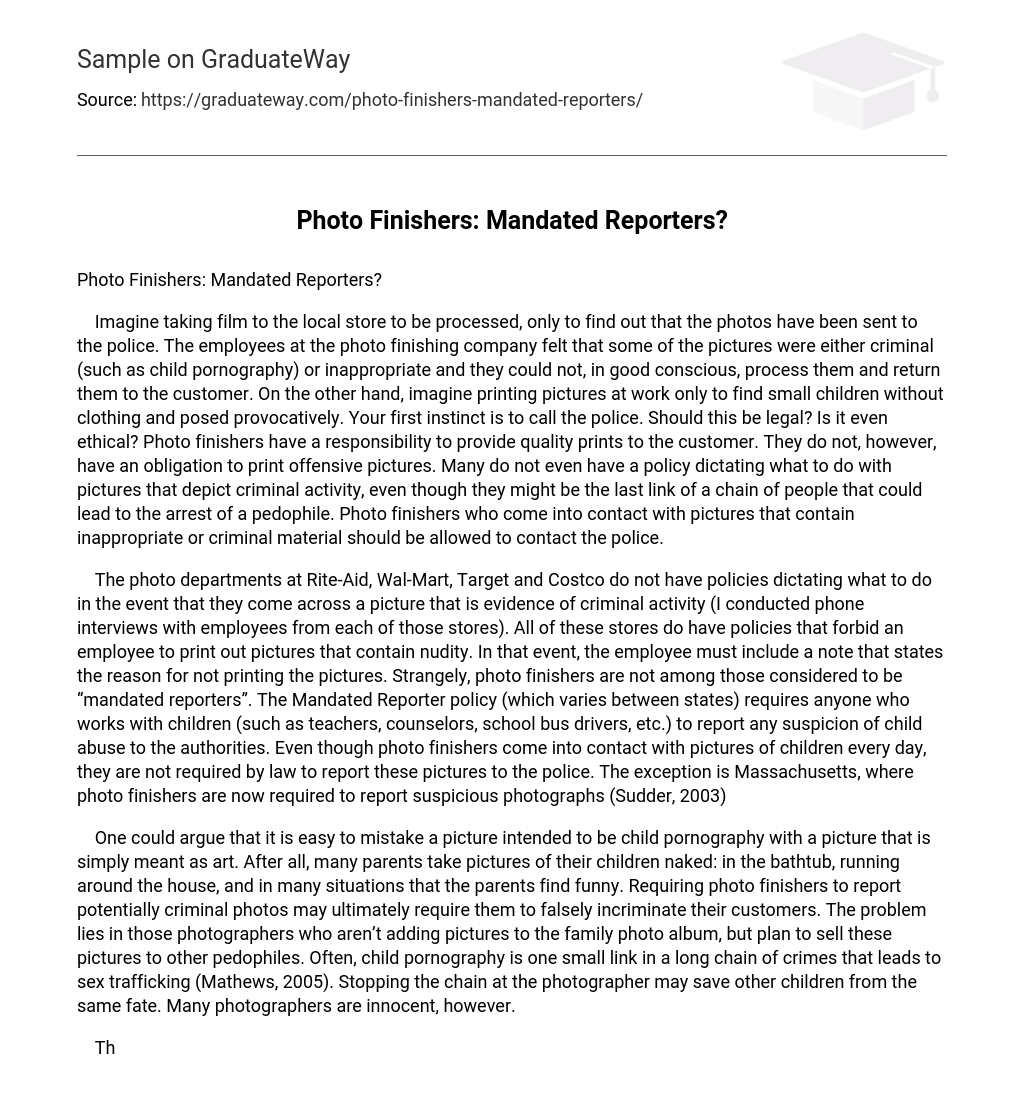Imagine taking film to the local store to be processed, only to find out that the photos have been sent to the police. The employees at the photo finishing company felt that some of the pictures were either criminal (such as child pornography) or inappropriate and they could not, in good conscious, process them and return them to the customer. On the other hand, imagine printing pictures at work only to find small children without clothing and posed provocatively. Your first instinct is to call the police. Should this be legal? Is it even ethical? Photo finishers have a responsibility to provide quality prints to the customer. They do not, however, have an obligation to print offensive pictures. Many do not even have a policy dictating what to do with pictures that depict criminal activity, even though they might be the last link of a chain of people that could lead to the arrest of a pedophile. Photo finishers who come into contact with pictures that contain inappropriate or criminal material should be allowed to contact the police.
The photo departments at Rite-Aid, Wal-Mart, Target and Costco do not have policies dictating what to do in the event that they come across a picture that is evidence of criminal activity (I conducted phone interviews with employees from each of those stores). All of these stores do have policies that forbid an employee to print out pictures that contain nudity. In that event, the employee must include a note that states the reason for not printing the pictures. Strangely, photo finishers are not among those considered to be “mandated reporters”. The Mandated Reporter policy (which varies between states) requires anyone who works with children (such as teachers, counselors, school bus drivers, etc.) to report any suspicion of child abuse to the authorities. Even though photo finishers come into contact with pictures of children every day, they are not required by law to report these pictures to the police. The exception is Massachusetts, where photo finishers are now required to report suspicious photographs (Sudder, 2003)
One could argue that it is easy to mistake a picture intended to be child pornography with a picture that is simply meant as art. After all, many parents take pictures of their children naked: in the bathtub, running around the house, and in many situations that the parents find funny. Requiring photo finishers to report potentially criminal photos may ultimately require them to falsely incriminate their customers. The problem lies in those photographers who aren’t adding pictures to the family photo album, but plan to sell these pictures to other pedophiles. Often, child pornography is one small link in a long chain of crimes that leads to sex trafficking (Mathews, 2005). Stopping the chain at the photographer may save other children from the same fate. Many photographers are innocent, however.
The other category of pictures is “inappropriate”. The manager at Wal-Mart stated that offensive pictures were those that contained nudity and that their policy stated they would not print such pictures. Other than pictures containing nudity, none of the photo processing centers had any restrictions in regard to which pictures to print. The question is in regard to which pictures to report to the police. As there are few states that have laws about reporting child pornography, it is unlikely that states will pass laws on photographs that are simply “offensive”. For this reason, photo finishers need to use their own judgment in determining whether or not the images presented in pictures represent a danger to anyone. The fear of losing customers may keep them in line and discourage them from sending pictures to the police unnecessarily.
The logical argument is that photographers have a right to privacy. They only intended the pictures to be developed and printed; not viewed by others, especially not the police. The problem is that once they let the film out of their hands and into the hands of a public entity, photographers are essentially giving permission for others to view those pictures. While the Constitution allows protection against unreasonable search and seizures, putting potentially incriminating photographs in the hands of the average photo finisher does not fall into this category (Amendment 4). The Supreme Court has allowed for a right to privacy in the matter of contraception and abortion, but not in regard to photographs.
In conclusion, the question of whether photo finishers should be allowed to send potentially illegal or offensive photographs to the police is not a legal question at all. It is an ethical or moral decision that can only be made by the person developing the pictures and printing the photographs. That is the person who needs to decide if the sight of a naked child in a photograph is intended to be funny, or if it is intended to arouse a pedophile. They should think about the consequences for the child in the picture: If this picture is not sent to the police, is it possible that this child will be harmed? They should also look at the other side of the issue: some pictures are simply in fun and do not harm anyone. These are the pictures of children playing in the bathtub and the couples who want to entice each other with racy photographs. While photo finishers should be not only allowed, but mandated to send potentially harmful pictures to the police, they should also take care not to cause a potential legal firestorm for those who don’t deserve it.
Resources:
(2006 May 12). Amendment 4. Retrieved November 10, 2006, from U.S. Constitution Online Web site: http://www.usconstitution.net/xconst_Am4.html
Mathews, S. (2005). International Trafficking in Children: Will New U.S. Legislation Provide an Ending to the Story?. Houston Journal of International Law, 27(3), 649+.
Sudder, M (2003 Jun 18). Children’s Cabinet Testimony. Retrieved November 10, 2006, from MSPCC Web site: http://www.mspcc.org/index.cfm/fuseaction/page.viewpage/pageid/173
;





